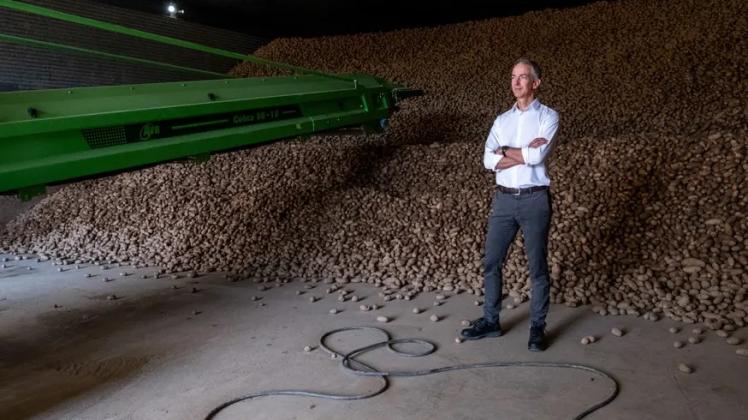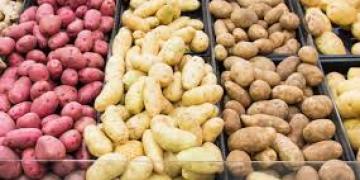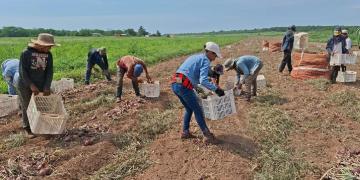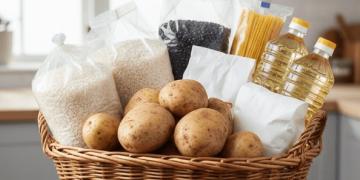Gran Bretaña: Star Trek for potatoes: can a hi-tech farm save french fries from the climate crisis?
Researchers flock to New Brunswick, Canada, to test both cutting-edge and bygone methods of spud cultivation to meet a challenging future.

by Dominic Rushe in Florenceville, Canada, with photographs by Adetona Omokanye
Against a backdrop of blue skies and autumn leaves that would make an Instagram filter blush, a group of agricultural postgraduate students at a New Brunswick farm are tinkering with technology they hope will one day help solve an existential crisis: how to save the world’s potatoes.
The Canadian farm in Florenceville is owned by the McCain family, heirs to a 65-year-old frozen food business that is now the largest manufacturer of frozen potato products in the world and supplies restaurant giants including McDonald’s. The company claims one in every four fries in the world is a McCain fry.
But like an increasing number of people in the food and agricultural sector, McCain Foods executives worry what the weirding of the world’s weather means for their business and the future of the planet.
Max Koeune, a multilingual Luxembourger who is McCain’s CEO and president, has a global view of just how quickly the climate crisis is affecting the world. McCain sources its potatoes from about 3,500 farmers worldwide, from smallholders to giant corporate farms, and is updated daily on how the climate is changing.
“When I joined we had a bad crop every 10 years that was ‘historical’ – you wouldn’t know when it was coming. For the last 10 years, there’s been a bad crop somewhere every year,” Koeune says.
The New Brunswick “farm of the future” is one of a series of laboratories the company plans to roll out across the world as it tests what practices are best suited to saving potatoes, while cutting the company’s carbon emissions. McCain has committed to implementing regenerative agricultural practices across all of its potato acreage worldwide by the end of 2030.
The different geographies will allow McCain to assess different environments. New Brunswick has a short growing season and frigid winters. In South Africa, where another farm is being set up, potatoes grow all year round but water scarcity is more of an issue than in (historically) rainy Canada.
Not that water isn’t a problem in Canada too. Crops there were hit by floods in 2018 and 2019. A heat dome brought “head-shaking” temperatures to Canada and large parts of the US in 2021. Droughts in Europe and the UK have also hurt potato yields, driving them down by double digits. “We can no longer use the past to work out what’s going to happen with our business,” says Koeune.
With populations growing and temperatures rising, shifting to a more sustainable future in agriculture is essential. According to a 2018 analysis of the food system’s impact on the environment published in Nature, if the systems we use now don’t change, the environmental effects of the food system could increase by 50%-90% by 2050, “reaching levels that are beyond the planetary boundaries that define a safe operating space for humanity”.
You should think of the potato like a human being, says Koeune. “They like a temperate climate. They shiver when they are too cold and they sweat when they are too hot. That’s all energy that’s needed for them to grow.” After 10,000 years of domestication, our increasingly intemperate world now threatens the future of the third most important food crop after rice and wheat.
“What’s happening impacts us as growers, us as people, us as a company. We have to think about this differently,” says Koeune.
The model farm feels a little like Star Trek for potatoes: an international, multicultural crew armed with laptops, sensors and drones boldly going where no potato farmer has gone before.
A team of postgrads from Dalhousie University is working on a crop-spraying rig that uses artificial intelligence to identify bugs and weeds that can harm the crop. Instead of spraying the whole field, pattern-recognition systems spot unwanted invaders and direct nozzles to target them. It takes just 200 milliseconds to identify a beetle and spray it.
Humphrey Maambo, a PhD student, excitedly waves a small blue flag representing a bug under a nozzle to show how it works. Spritz! The flag is dead. He calculates the spray rig could cut insecticide use by 50%-80% and says it could easily be retrofitted to existing machines.
On a potato-sorter, or the “autonomous vision tuber grading machine”, sensors scan potatoes as they enter a storage shed. Red, green and blue lumps appear on a screen, like disassembled versions of Ugo Rondinone’s brightly colored rock sculptures. The machine scans for gravity and density, important for fry quality and problems like “hollow heart” – when cavities form in a tuber.
Traditionally, farmers have manually sampled a small number of potatoes from a field to ascertain quality. This new system, though, assesses seven out of every 200 potatoes, giving much more data to identify problems and even trace them back to where they arose.
Another unit reads gamma rays to draw up a physical and chemical map of the field. McCain scientists are also using DNA sampling to quantify the biodiversity of their plots, drones to see how the crop is growing close up and satellite imagery to capture the bigger picture.
Not all of the initiatives are hi-tech, and Yves Leclerc, director of agronomy, North America, at McCain Foods, thinks we are too obsessed with the toys. “It’s all about the soil. It’s the soil that matters,” he says earnestly, scampering off into the field to pull out plants and handfuls of soil.
The farm is trialing initiatives to reduce tilling, which enables the soil to retain more organic matter. Cover crops have been planted to protect the field once the potatoes have been harvested – last year the team planted 28 different varieties. It is an old practice in which plants provide nutrients for the soil and protect against pests – millet, for example, helps to protect against nematode worms. This year, Leclerc worries they have planted too much buckwheat and orchard grass. “We are dealing with a complex system. It’s not a simple recipe, all things evolve.”
The cover crops also help the soil retain water. “Holding water in the soil is the best way to overcome increasing temperatures,” says Dr Manphool Fageria, senior scientist and manager of the farm of the future. “In 2020 growers lost 35% of their yields here because it was so dry.”
Cover crops cost more, in terms of labor as well as seeds. But they are cheaper than the long-term alternative, soil erosion, says Fageria. And in a neat synthesis of old and new, all the data farmers are now able to collect can pinpoint which cover crops best help them increase their yields.
McCain’s fields stand in verdant contrast to the bare brown empty earth of its potato-farming neighbors. The company is hoping its experiments will encourage others to follow suit. Almost all of the world’s food is grown in the uppermost layer of soil, but half of the planet’s most productive soil has disappeared in the last 150 years due in part to modern farming practices.
In another field, an older method of farming is being tested. A herd of cows, borrowed from a neighboring farm, graze and lazily moo, crop the vegetation and unload manure. Fageria hops in to show how the herd is moved around the field with remote-controlled mobile fencing. Fences are expensive and Fageria is considering switching to electronic collars that would keep the cows within defined GPS coordinates. The cows seem very comfortable with Fageria, perhaps because he is a vegan or perhaps because he grew up on a farm in Rajasthan, India, herding camels, goats and sheep. “We have decoupled animal from plant production. In that system manure becomes a problem. In this one it’s a solution,” he says.
The enthusiasm is palpable but how might this come across to farmers struggling with soaring inflation and the climate emergency?
This project will not matter if farmers don’t buy into the change, Koeune admits. “Farmers are not interested in concepts. It has to be tangible. We have to do it, show that it works and prove that it’s economically viable,” he says. “Farmers believe what they see.”
It’s only year two but yields at the New Brunswick farm appear to be rising. And the rising power and falling costs of computers mean the technology the McCain team is experimenting with could be within reach of many farmers.
Koeune says McCain alone cannot change the world. On Thursday, McCain and other big companies including Mars and PepsiCo released a report arguing that the amount of sustainable agriculture needs to triple in size by 2030.
In France, McCain has partnered with Crédit Agricole to extend loans to farmers who invest in sustainable agriculture. McCain picks up the interest charges while the farmers repay the capital. It’s a deal that might make publicly owned ag companies wince but “as a family-owned company, McCain thinks in generations”, says Koeune. “There’s no good business for us if there isn’t a healthy agricultural community.”
McCain’s measures look promising, says Andrew Challinor, professor of climate impacts and a crop modeler at the University of Leeds in the UK. “Trialing new approaches and measuring success is a sensible first step before going to scale.”
But other experts suggested McCain needed to think bigger if it really wants to change the food system. “McCain is the supplier for McDonald’s, which serves more beef than any restaurant chain on the planet,” says Jennifer Molidor, senior food campaigner at the Center for Biological Diversity, based in Tucson, Arizona. “Cover crops and no-till [farming practices] have become window dressing for business as usual,” she adds. “These practices may have some benefits but not if they support the overproduction of the most climate-intensive foods like beef.”
Raj Patel, author and professor, says “it’s good to see reductions in fertilizer use, and a move away from monoculture,” but to make a difference, he adds, means pushing against current economic policy, which supports the most environmentally damaging food production activities.
“There is going to be a lot of skepticism,” admits Koeune. Mindful of the greenwashing that has undone so many other “sustainable” initiatives, McCain says it will regularly publish its findings and be as transparent as possible as it tries to win people over. People shouldn’t underestimate the reluctance of the agricultural sector to change, Koeune says. “But the cost of not changing is being demonstrated on a daily basis. It’s relentless.”
As you’re joining us today from Argentina, we have a small favour to ask.
There can be no more hiding, and no more denying. Global heating is supercharging extreme weather at an astonishing speed. Guardian analysis recently revealed how human-caused climate breakdown is accelerating the toll of extreme weather across the planet. People across the world are losing their lives and livelihoods due to more deadly and more frequent heatwaves, floods, wildfires and droughts triggered by the climate crisis.
At the Guardian, we will not stop giving this life-altering issue the urgency and attention it demands. We have a huge global team of climate writers around the world and have recently appointed an extreme weather correspondent.
Our editorial independence means we are free to write and publish journalism which prioritises the crisis. We can highlight the climate policy successes and failings of those who lead us in these challenging times. We have no shareholders and no billionaire owner, just the determination and passion to deliver high-impact global reporting, free from commercial or political influence.
And we provide all this for free, for everyone to read. We do this because we believe in information equality. Greater numbers of people can keep track of the global events shaping our world, understand their impact on people and communities, and become inspired to take meaningful action. Millions can benefit from open access to quality, truthful news, regardless of their ability to pay for it.
Whether you give a little or a lot, your funding will power our reporting for the years to come. Support the Guardian from as little as $1 – it only takes a minute. If you can, please consider supporting us with a regular amount each month. Thank you.
Fuente: https://www.theguardian.com/environment/2022/nov/05/potatoes-future-climate-emergency-canada




